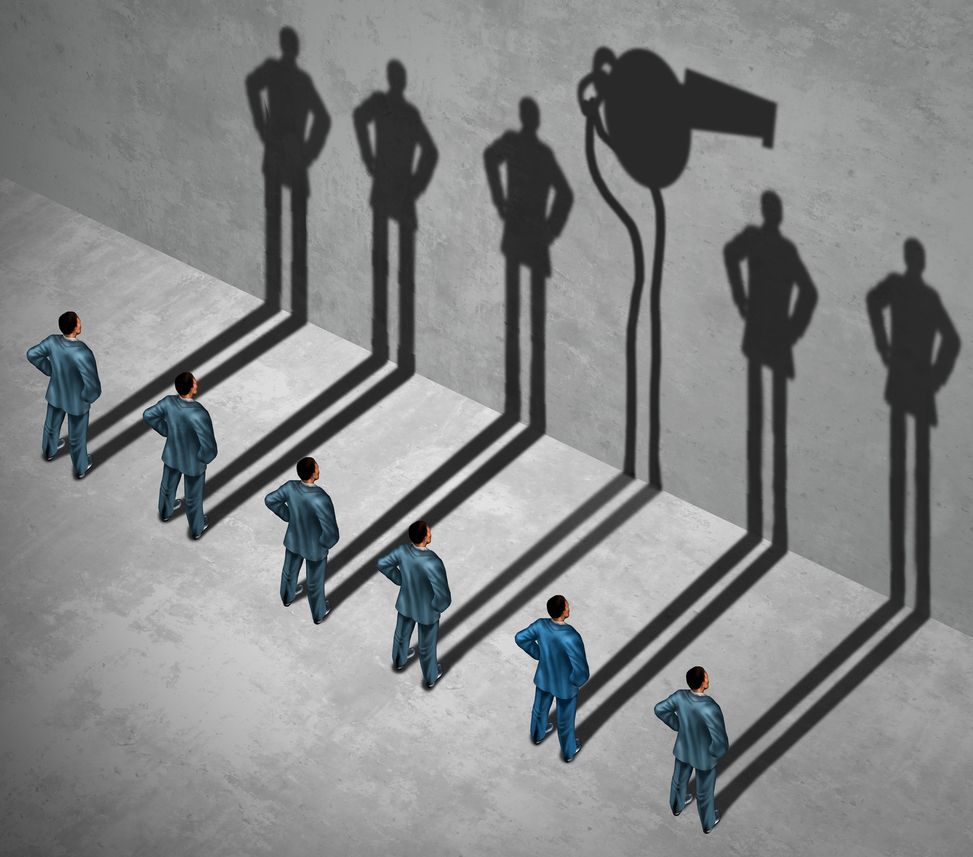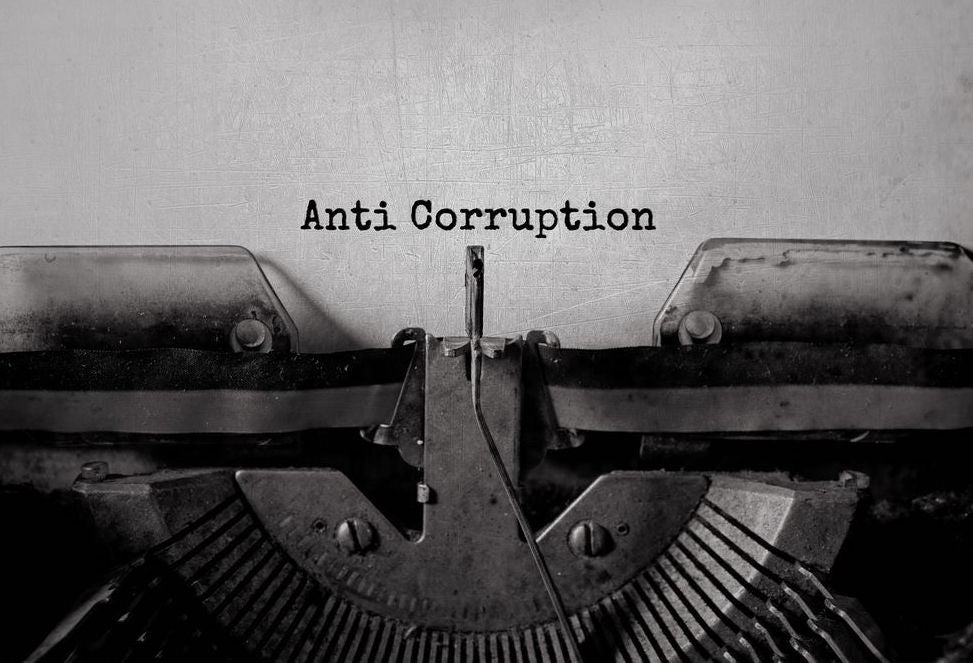
The act of whistleblowing is glorified in movies like Michael Clayton, The Constant Gardener, Serpico, and The Insider. In these films and so many others, individuals with a strong ethical compass step up and call to attention the wrongs being committed in their midst — often in their workplaces.
Whistleblowers truly are heroes. They invest time and effort, and risk losing their jobs (and even friends) in order to fight the forces that erode the moral fabric of our communities. In some cases, they are nurses, doctors, or other professionals who’ve undergone extensive schooling and taken an oath to serve, according to Lee Walters, a former FBI agent and investigator for Morgan & Morgan’s Whistleblowers unit.
“They see greed and people cutting corners, and might even see patient harm, and they don’t like it. They want it to change,” Walters said.
Walters and fellow investigator and former FBI agent David Reign play a key role in helping Morgan & Morgan’s whistleblower clients file lawsuits against companies — often their employers — that commit fraud. They have extensive experience infiltrating and exposing corrupt police officers, investigating massive institutional fraud, uncovering government contractors stealing taxpayer money, and, overall, helping honest people hold the dishonest accountable. Here, you have the opportunity to learn more about them and what they do.
“Being a whistleblower is not easy, but doing the right thing is never wrong.” – David Reign, investigator
With a Whistleblower Every Step of the Way
In the aforementioned films, Hollywood often does a surprisingly good job of showing the sacrifices whistleblowers make. However, telling a good story doesn’t always underscore what being a whistleblower truly entails.

“A whistleblower needs to recognize that the process will take several years, and during that time there will be an emotional toll on them,” Reign says. “They are not allowed to discuss the case with friends, neighbors, or coworkers.”
But who they can talk to is Reign and Walters, who work closely with clients for the entire length of a case. No matter if it’s five months or five years, these two veterans in the fight against corruption are the sounding board, confidantes, and caretakers for courageous whistleblowers.
If they sound a bit grim, it’s only because they care. They want to be sure to be honest with potential whistleblowers about what they’re getting into. They want them to be prepared.
“We don’t sugarcoat it,” Walters says. “These cases are long-term and have consequences.”
Nevertheless, many whistleblowers aren’t deterred. They want to do what’s right.
“Being a whistleblower is not easy, but doing the right thing is never wrong in my opinion,” Reign says.
Waco, Enron, Rogue Cops and the Super Bowl: Experience That Helps Whistleblowers
Walters and Reign are both investigators for whistleblower cases after decades with the FBI — Walters a former supervisory special agent with 24 years of investigative experience in some harrowing situations and Reign with decades of experience unraveling often terribly complex white-collar crimes, in addition to protecting major events like the 2003 Super Bowl and the 2012 Republican National Convention. Each brings to their work lessons learned from those unforgettable experiences.

Walters’ time with the FBI saw him involved in some major probes into corruption. In one case, he spent two years undercover investigating rogue factions of the Chicago police department, which led to the conviction of seven police officers.
He was also a member of a handful of agents trained on how to defeat any alarm system or electronic access technology; and before that he worked out of Chicago and Little Rock wiretapping phones, planting tracking and listening devices, installing hidden cameras, and using other types of technology to support investigations. Additionally, Walters was a member of the FBI’s Art Crime Team, an elite group of 12 special agents trained to conduct art crime investigations.
“There’s really no investigation that I would have any trouble putting together.” – Lee Walters, investigator.
Walters’ work early in his career exposed him to some particularly egregious fraud. He was investigating a savings & loan — one of those bank types that used to be much more prevalent in the 1980s. Regulations had been loosened on these organizations, and bogus loans abounded. The system would largely collapse on its own moral decay, resulting in billions of dollars worth of federal bailouts, and would cost some politicians and their associates their careers.
In the case he was working on, the perpetrators had named themselves CEO and president of a savings and loan in the middle of nowhere, and started giving loans to friends on the West Coast while paying themselves big salaries. They ended up costing the taxpayer $100 million in bailouts.
“That was one of my first big cases,” Walters said.
Later, as a SWAT member, Walters was deployed to the Branch Davidian compound in Waco, Texas; and the Los Angeles riots that followed the Rodney King verdict; among other things.
With a past like that, it’s no surprise that Walters isn’t a shrinking violet when it comes to standing up for whistleblower in tough cases.
“Having some of the cases I had a chance to work on — I think it teaches you perseverance,” Walters said. “There’s really no investigation that I would have any trouble putting together.”
He knows how to gather evidence in the most effective way and if it seems like a case is getting too tough, he sticks with it undeterred. (More on the actual investigator-whistleblower relationship later in this piece.)
You might think that for Reign the worst corruption he’s encountered is the billion-dollar boondoggle of Enron, a company that’s become shorthand for large-scale, systematic fraud.
David Reign, on the impact of fraud: “Lives and dreams are destroyed.”
Enron certainly left a crater on the landscape in many ways — Reign’s investigative team consisted of 40 SEC, IRS, and FBI agents whose work landed several high-profile convictions amid accusations of fraud on an epic scale. Even so, he says there’s something smaller, and more pervasive and sinister that can ruin lives: ponzi schemes that prey on the elderly and the desperate, convincing them to give away their modest, $5,000 to $10,000 nest eggs for inherently fraudulent ends.
“Lives and dreams are destroyed,” Reign says, recalling when he worked on these types of cases. “You lose faith in your fellow man.”
He encountered a career conman who would scam $10,000 from people of modest means, who handed him their money believing his promise of a big investment returns. He did return large investments for the first few people, providing himself cover in the form of references from those happy customers. That didn’t last long: eventually everyone lost.
“I remember interviewing an elderly couple who had given $10,000 to this man,” Reign says. “They checked his references and they all seemed good. They were trying to pay for their grandchild’s tuition to college, and had enough for maybe year or so. They invested $10,000 in hopes of it growing so they could pay for their grandchild’s entire college tuition.”
“Of course,” Reign continued. “They lost all of that money.”

‘Sometimes a Good Trait Is Actually a Bad Trait’
In both their FBI and post-FBI careers as highly regarded investigators for Morgan & Morgan, Walters and Reign have noticed some common traits among fraudsters.
One theme among contractors who scam the federal government — thereby violating laws such as the Lincoln-era False Claims Act — is that they find it easy to think that they’re not harming anyone. It’s just the government, which isn’t a person, so it’s not a big deal: “There’s that mentality that if nobody’s watching the ship, they can get away with charging more than they should,” Walters says.
Digging even deeper to take a look at the people, and not just the companies, behind fraud, there is a sense of a decline of values — good people turn bad. But at their core, they might look very familiar.
“People who commit fraud are just like you and me,” Reign said. “They have families, relationships, and friends, and are probably good at their jobs ‚ they maybe even liked their job at one time.”
But then something happens. That’s when a potential whistleblower notices secretive behaviors. Sometimes it seems like there are more closed-door meetings than there used to be. There could be a disregard for the basic rules and regulations of an organization.
One big motivation? “Most of the time it’s greed,” Reign said.
Sometimes, though, it’s not the presence of bad or strange behavior that will tip off a whistleblower. In fact, it could be just the opposite. Reign recalls one such scenario in a case involving a seemingly dutiful 10-year employee of a credit union who turned out to be committing fraud.
“We focused our attention on the bookkeeper, who came into work every day — never got sick and almost never took any days off,” Reign said. But when that employee did take a fews day off, there was a surprise waiting.
An assistant noticed something was off in the books and asked a manager for help. The fraudulent activity was revealed. When thinking about how the culprit ended up being the “good employee” no one suspected, Reign had the following sage wisdom: “Sometimes a good trait is actually a bad trait.”
Walters added that some of the fraud he’s seen starts out with people who skim a small amount of money with the intention of returning it when, for example, they get their next paycheck.
“They think, ‘I’ll do this one more time,’” Walters says, noting how often the size snowballs. “It adds up to thousands or more in fraud. I imagine it’s a pretty stressful way to live.”

Potential Whistleblowers: Keep These Things in Mind
As mentioned earlier, being a whistleblower is a very noble role. But it isn’t easy.
“Perhaps the biggest challenge is tying together evidence,” Walters says. For a whistleblower case, there has to be a good amount of evidence to present with the lawsuit. “A lot of time when a whistleblower calls in, they haven’t been gathering evidence.”
No doubt the whistleblower has witnessed problematic practices and want to put a stop to them, but they need the evidence to back up their case so that the government will take it on. It’s tricky, though, because gathering evidence can be difficult, and even risky.
“Getting access to evidence is a challenge,” Walters said. “It’s sometimes tough to be able to gather that evidence without getting fired. A lot of employers have a radar up for anyone who would be a potential whistleblower.”
Despite that, it’s important to try to gather as much evidence as possible in a reasonable way. This includes taking copious note, he said.
Another thing to consider is that these cases take a while and, as mentioned earlier, whistleblowers generally have to keep their involvement in a case confidential. They also face potential ostracization and even problems getting new jobs down the line, Walters says.
Even if the case is life-changing, it’s not without its benefits. For example, whistleblowers whose cases are picked up by the government — these people are known as “relators” — are able to get between 15 and 25 percent of the total recovery the government gets from a fraudulent contractor. But, both Walters and Reign say, money isn’t the number one reason people come to them.
Whistleblowers contribute to upholding the moral fabric of our society — a foundation so easily chipped away in a death by a thousand fraudulent actions.
“They want to right the wrong they’ve encountered,” Walters said.
This Is Why Investigators Are So Important to a Case
Working a whistleblower case is a team effort — attorneys, investigators, and support staff all come together to help someone safely and effectively shine a spotlight on institutional wrongdoing. Reign and Walters enter the picture early on, gathering facts and conducting initial interviews, and stick with a client for the long-haul.
“Our job is to basically find out what the allegation is, how long it’s been going on, and what kind of evidence a person may have or have access to,” Walters says. “Then we explain the whole whistleblower process, because it’s not a common process for people to know.”
Once things get going, Walters and Reign are there for the whistleblower every step of the way.
“We’ll spend countless hours with a client, developing key details and aspects of the case,” Reign said. “Besides face-to-face conversation, we’ll spend a lot of time exchanging emails and telephone calls. We gather info by questioning them, reviewing documents, probing… we both work with a couple talented attorneys on the whistleblower team.”
During their conversations with whistleblowers, Reign and Walters find that inevitable, over time, more and more details are revealed about the client’s experience. Certain questions, or just the passage of time, serve to allow the client to remember key details and evidence they didn’t think to bring up during initial discussions.
“That happens all the time,” Reign says. “You think you know about something — think you told us everything — but then you sleep on it or there’s a question we pose and it comes to you.”
With all of that in mind, Walters and Reign patiently and carefully work with a client to build a case they can bring to the government, which will then consider whether to bring a suit with the whistleblower client. In many cases, the government would not have been aware of the fraudulent activity had the relator not come forward.

The Great Reward Is Serving Whistleblowers
Both Walters and Reign certainly had rewarding careers before joining Morgan & Morgan, but they draw a great deal of inspiration and sense of purpose from their roles serving whistleblowers.
“When we’re successful in a case, that’s obviously very rewarding to us,” Reign says, noting that success can be measured in a range from exposing criminal activity to the federal government taking the case and recovering fraudulently obtained funds. Not only can it lead to reforms in business practices in an industry like healthcare, it also gets the whistleblower something for their holistic investment and overall helps to keep society that much more honest.
“We can effect change in the system,” Walters says.
In that way, the Hollywood portrayal of whistleblower cases is accurate. It’s about heroes rising up to change the system. It’s also a mission that’s never truly over — they heroes might win one case, but they’ll return for a sequel.
“There’s potential fraud in all spectrums of life,” Walters says. “No organization is immune to fraud — from the five-person, family-owned or single-owner business to an organization that has 100,000 people. When we pursue these cases, we’re putting the system on notice.”
If you or someone you know has witnessed fraud and is interested in helping to effect change, contact our whistleblower attorneys today for a free, no-risk case evaluation. The attorneys, investigators Walters and Reign, and everyone else on the team are ready to help you.

